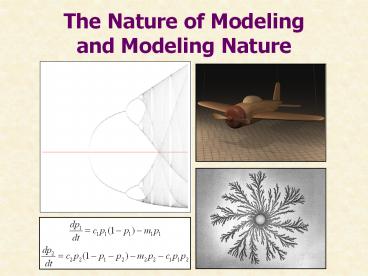The Nature of Modeling and Modeling Nature - PowerPoint PPT Presentation
1 / 10
Title:
The Nature of Modeling and Modeling Nature
Description:
... Optimal Foraging Theory (Bull et al. 2004) Spatial Competition Hypothesis ... One might suggest an iterative algorithm when it comes to modeling: ... – PowerPoint PPT presentation
Number of Views:103
Avg rating:3.0/5.0
Title: The Nature of Modeling and Modeling Nature
1
The Nature of Modelingand Modeling Nature
2
Role Models on the Role of Models
- The sciences do not try to explain, they hardly
even try to interpret, they mainly make models
The justification of such a mathematical
construct is solely and precisely that it is
expected to workthat is, correctly to describe
phenomena from a reasonably wide area. - John Von Neumann
von Neumann
3
(No Transcript)
4
Models
- What is modeling all about? Is it
- My feeling is no.
- Modeling is about
- abstraction
- simplification
- isomorphism (e.g., being able to envision
fundamental similarities between different
systems) - This need not be mathematical. In a very real
sense, we all approach our study systems through
models, as we - generally work within frameworks of abstracted
hypothetical mechanisms. - cannot possibly entertain all details of the
system.
?
5
A Broad Umbrella
- Verbal
- Graphical
- Statistical
- Computer-based
- Mathematical
Competitive Exclusion Principle
Complete competitors cannot coexist (Hardin,
1960)
6
How much simplification?
CONTINUUM
- Detail-rich
- Specific in target
- Parameter values (or sensitivities to changes in
these values) become important - Predictions are narrow
- Empirical tests can be quantitative
- Highly abstracted
- General in target
- Relations between parameter values take
precedence over their specific values - Predictions are broad
- Empirical tests are often qualitative
7
Why Toys?
8
So, whats the point?
- Must a model make testable predictions in order
to be valuable? - Is Hardins competitive exclusion principle (and
Newtons laws of motion, Hubbells neutral
theory, etc.) truly untestable? - Forming a model is very much like creating a
virtual world. - Claims made about this virtual world need to
logically follow from assumptions (mathematics is
a useful tool here) - This virtual world in essence becomes an
experimental system (we ask what happens when we
wiggle that parameter or fix that variable) - One concern is whether our virtual world tells us
useful things about the real world - Are the assumptions of the model satisfied or
violated? - Does the structure of the model reflect (aspects
of) reality? - Does the model suggest new empirical directions?
- One might suggest an iterative algorithm when it
comes to modeling The form of the virtual world
is dependent on empirical findings and future
empirical work is informed by this virtual world.
9
But why math?
- The major advantages of a mathematical model are
- The virtual world is very well-defined (e.g.,
Hardins C.E.P. verbal model is ambiguous) - The assumptions are (at least implicitly) made
clear - Mathematical techniques address dynamics that we
may not be able to intuit (e.g., feedback,
network behavior, multiple spatial or temporal
scales, etc.). - Example (Buss Jackson 1979)
- Buss Jackson claimed that as A grows faster and
faster, it will exclude B and C - A mathematical model (Frean Abraham, 2002) of
an abstracted version of this system shows this
plausible conclusion to be off the mark. These
authors find that as A chases B faster, this
liberates C with a net negative effect on A! - One intuition (faster growth means better
competitive ability) is supplanted by another
(the enemy of my enemy is my friend).
Mathematics helps tease such intuitions apart.
A
A
C
B
C
B
10
Questions
- What do you think models are?
- What role do models play in the context of
science? - What role do models play in the context of
ecology? - What role are models likely to play in your own
research? - How central is accurate prediction to the worth
of a model in your eyes? Are you convinced that
models can play other roles (e.g., exploring
possibilities, forming baselines for more complex
systems, inspiring empirical/experimental
directions, and providing explanations for
phenomena)? - In the case of Hardins (1960) essay, if the
competitive exclusion principle is taken to be a
verbal model, what do you think its worth is? How
does it relate to competition in laboratory or
natural ecosystems? How do you react to Hardins
statement that the truth of the principle
cannot be established by empirical facts? Do you
think this principle has something to offer those
studying competition in the field? Are you
convinced that the principle uncovers isomorphic
behavior in a number of different systems
(ranging from economics to genetics)?































